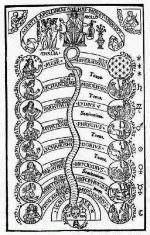Scion
Something else occurs to me in looking through the Book T stuff.
People keep saying that they don't now much about astrology, and I realized that for lots of people astrology is just that goofy drivel that turns up in short paragraphs in the paper. The modern obsession with sunsigns is the direct result of a man named Alan Leo who "simplified" astrology by throwing out most anything that was complicated or effective. Because of the prevalence of (lobotomized) sunsign astrology, moderns have an inflated idea about the significance of the Zodiac and the sun's position in it.
For a couple thousand years Astrology was far more concerned with the planets and their interrelationship. This is reflected in the Ptolemaic models of nested planetary spheres, in the Gnostic belief in planetary Archons, the alchemical characterization of the 7 terrestrial planets (aka metals), and the 7 day week.
The planets (from Greek planetes, meaning "wanderer") showed the evershifting perfection and power of the cosmos.The planets were the source of the energy that was filtered/charged by the sign.
The Seven planets were (moving from the Earth outward towards the fixed stars):
The Moon
Mercury
Venus
The Sun
Mars
Jupiter
Saturn
This order reflects their relative speeds, and is also the order with which they are mapped onto the Hermetic Tree of Life used by the Golden Dawn. This order ecame associated by various authors with everything from the angelic hierarchy to the Chain of Being to the Muses.
Anyways... not to get all didactic, but I thought a planetary thread was in order as well because it will help when we start digging around in the decans. There are folks on AT that know WAY more about pactical astrology than I do, and I'm hoping theyll join in to add to the soup and correct my mistakes...
People keep saying that they don't now much about astrology, and I realized that for lots of people astrology is just that goofy drivel that turns up in short paragraphs in the paper. The modern obsession with sunsigns is the direct result of a man named Alan Leo who "simplified" astrology by throwing out most anything that was complicated or effective. Because of the prevalence of (lobotomized) sunsign astrology, moderns have an inflated idea about the significance of the Zodiac and the sun's position in it.
For a couple thousand years Astrology was far more concerned with the planets and their interrelationship. This is reflected in the Ptolemaic models of nested planetary spheres, in the Gnostic belief in planetary Archons, the alchemical characterization of the 7 terrestrial planets (aka metals), and the 7 day week.
The planets (from Greek planetes, meaning "wanderer") showed the evershifting perfection and power of the cosmos.The planets were the source of the energy that was filtered/charged by the sign.
The Seven planets were (moving from the Earth outward towards the fixed stars):
The Moon
Mercury
Venus
The Sun
Mars
Jupiter
Saturn
This order reflects their relative speeds, and is also the order with which they are mapped onto the Hermetic Tree of Life used by the Golden Dawn. This order ecame associated by various authors with everything from the angelic hierarchy to the Chain of Being to the Muses.
Anyways... not to get all didactic, but I thought a planetary thread was in order as well because it will help when we start digging around in the decans. There are folks on AT that know WAY more about pactical astrology than I do, and I'm hoping theyll join in to add to the soup and correct my mistakes...


